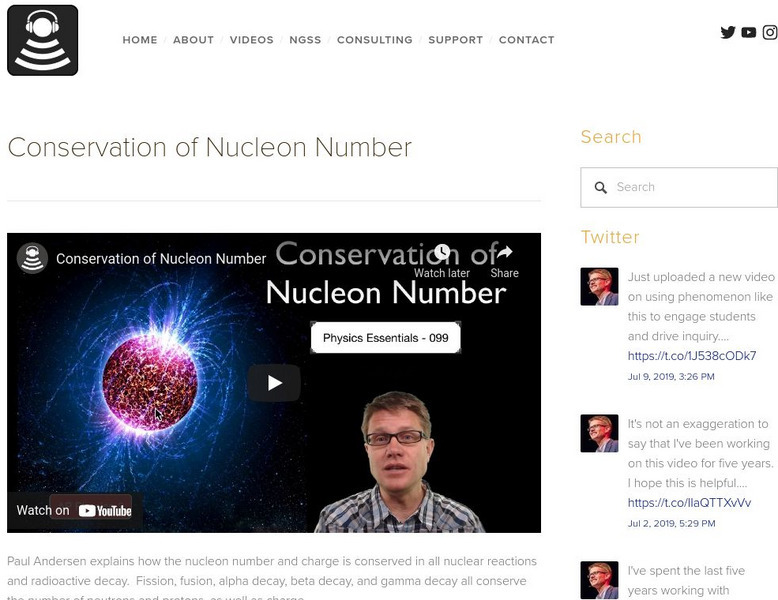SciShow
Why Does Everything Decay Into Lead
If you look at a copy of the periodic table, you might notice that basically every element after lead is labelled as radioactive. And the vast majority of those elements wind up decaying into some version of lead eventually. But why is...
PBS
Electroweak Theory and the Origin of the Fundamental Forces
Our universe seems pretty complicated. We have a weird zoo of elementary particles, which interact through very different fundamental forces. But some extremely subtle clues in nature have led us to believe that the forces of nature were...
MinutePhysics
How to Tell Matter From Antimatter | CP Violation & The Ozma Problem
This video was made with the support of the Heising Simons Foundation. This video is about the Ozma problem of distinguishing the chirality (ie left-handedness or right-handedness) of matter using weak interaction processes like beta...
SciShow
How to Date a Dead Thing
SciShow explains radiocarbon dating, the best way to date a dead thing!
Bozeman Science
Conservation of Nucleon Number
In this video Paul Andersen explains how the nucleon number and charge is conserved in all nuclear reactions and radioactive decay. Fission, fusion, alpha decay, beta decay, and gamma decay all conserve the number of neutrons and...
Crash Course
Nuclear Physics: Crash Course Physics
It's time for our second to final Physics episode. So, let's talk Einstein and Nuclear Physics. What does E=MC2 actually mean? Why is it so useful to us as physicists and humans? In this episode of Crash Course Physics, Shini sits down...
Bozeman Science
Radiation and Radioactive Decay
Mr. Andersen explains why radiation occurs and describes the major types of radiation. He also shows how alpha, beta, and gamma radiation affect the nucleus of a radioactive atom. Nuclear equations are also discussed.
Bozeman Science
Half-Life and Radioactive Decay
In this video Paul Andersen explains how a radioactive nuclei can decay by releasing an alpha, beta, or gamma particle. The exact moment of decay for each nuclei can not be determined but probability is useful in predicting the...
Curated Video
GCSE Physics - Nuclear Decay Equations #34
This video covers: - What alpha, beta and gamma radiation are - How to write decay equations for them General info: - Suitable for all GCSE and IGCSE courses - Suitable for higher and foundation tiers - Suitable for triple and combined...
Curated Video
Neutrons and Isotopes
Neutrons and Isotopes describes how neutron loss or gain affects the stability of an atom by using terms such as isotope, atomic mass, unstable, and decay.
FuseSchool
Types Of Radiation
Learn about the different types of radiation in this physics video from the virtual school. Alpha particles, beta particles and gamma rays... what are they and how do they differ?
Introducing 'Alpha Man', 'Beta Boy' and 'The Great Gamma'!
msvgo
Radioactivity
This nugget explains the concept of radioactivity, its types and mathematical expressions and examples.
Professor Dave Explains
Nuclear Reactions, Radioactivity, Fission and Fusion
Radioactivity. We've seen it in movies, it's responsible for the Ninja Turtles. It's responsible for Godzilla. But what is it? It's time to learn exactly what nuclear reactions are, and what it is that makes atomic bombs so destructive,...
FuseSchool
Stable and Unstable Nuclei
Stable and Unstable Nuclei | Radioactivity | Physics | FuseSchool How do you know if an atom is stable? In this video we are going to learn about radioactive decay and that unstable nuclei either have too many protons or too many...
DoodleScience
Half-Life _ GCSE Physics
When a radioactive atom goes through alpha or beta decay, the atom itself changes into a different element. For example, carbon-14 decays to nitrogen-14 when it emits beta radiation. It’s impossible to predict when an individual atom...
Khan Academy
Khan Academy: Types of Decay
Sal illustrates the different types of decay: Alpha, Beta, Gamma Decay and Positron Emission. [17:00]
Khan Academy
Khan Academy: Writing Nuclear Equations for Alpha, Beta, and Gamma Decay
Sal will discuss how to write nuclear equations for alpha, beta, and gamma decay when studying radioactive decay. [8:02]
Khan Academy
Khan Academy: Chemistry: Types of Decay
The various ways a nucleus can decay, including Alpha, Beta and Gamma decay as well as positron emission. [17:02]
Khan Academy
Khan Academy: Chemistry: Half Life
A video lecture discussing radioactive decay and half lives. Understand how half life and the mass of the compound remaining is calculated by following the examples given in the lecture. [12:31]
Bozeman Science
Bozeman Science: Conservation of Nucleon Number
In the following video Paul Andersen explains how the nucleon number and charge is conserved in all nuclear reactions and radioactive decay. Fission, fusion, alpha decay, beta decay, and gamma decay all conserve the number of neutrons...
Crash Course
Crash Course Physics #45: Nuclear Physics
It's time for our second to final Physics episode. So, let's talk Einstein and Nuclear Physics. What does E=MC2 actually mean? Why is it so useful to us as physicists and humans? In this video episode of Crash Course Physics, Shini sits...






